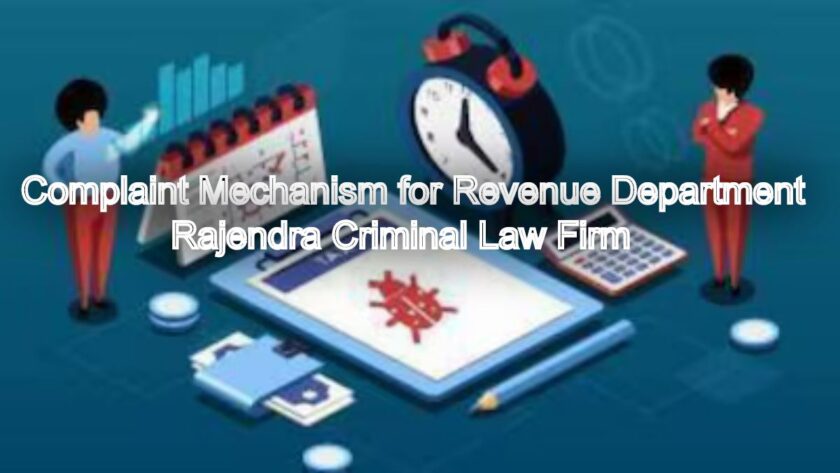State governments play a vital role in land administration and revenue collection. Revenue department officers form the backbone of this system. However, like any large organization, issues and grievances can arise. Therefore, effective complaint mechanism are essential. These mechanisms provide a channel for addressing concerns related to the conduct and actions of revenue department officers. Rajendra Criminal Law Firm understands the complexities of these interactions. We offer guidance to individuals seeking to file complaints. Our expertise ensures that your grievances are heard and addressed appropriately.
Seeking Redress: Understanding Complaint Mechanisms for Revenue Department Officers
The Need for Complaint Mechanisms: Ensuring Accountability
Complaint mechanisms serve several crucial purposes. Firstly, they promote accountability among revenue department officers. Knowing that their actions can be subject to scrutiny encourages diligence and ethical behavior. Secondly, these mechanisms provide a platform for citizens to voice their concerns. This fosters transparency and trust in the system. Furthermore, addressing grievances promptly can prevent escalation of issues. Consequently, a well-functioning complaint mechanism is vital for maintaining the integrity of the revenue department.
Levels of Complaint Redressal: A Multi-Tiered Approach
Complaint Mechanism: Most state governments have established a multi-tiered system for addressing complaints. Initially, a grievance can often be lodged with a higher-ranking officer within the same department. For instance, complaints against a Talathi might first be addressed by the Tahsildar. Subsequently, if the complainant is not satisfied with the initial resolution, they can escalate the matter to higher authorities. This might involve the District Collector or the Divisional Commissioner. Moreover, at each level, there are designated procedures for receiving, investigating, and resolving complaints. Therefore, understanding this hierarchy is crucial for navigating the complaint process effectively.
Formal Complaint Procedures: Documenting Your Grievance
Complaint Mechanism: Filing a formal complaint usually involves submitting a written application. This application should clearly state the details of the grievance. Furthermore, it should identify the officer against whom the complaint is being made. Additionally, it is important to provide specific dates, times, and locations related to the incident. Moreover, any supporting documents, such as copies of official records or correspondence, should be attached. Consequently, a well-documented complaint provides a clear and factual basis for investigation.
Online Complaint Portals: Leveraging Technology for Accessibility
Many state governments have now introduced online portals for lodging complaints. These portals offer a convenient and accessible way for citizens to register their grievances. Typically, these portals require the complainant to register and provide details of the complaint online. Moreover, they often allow for the uploading of supporting documents. Furthermore, these systems usually generate a unique tracking number for each complaint. This enables the complainant to monitor the progress of their grievance. Therefore, online portals enhance transparency and efficiency in the complaint redressal process.
The Role of Internal Vigilance Mechanisms: Departmental Oversight
Within the revenue department itself, there are often internal vigilance mechanisms. These units are responsible for investigating allegations of misconduct and corruption. For example, a special vigilance wing might handle complaints of bribery or misuse of official powers. Moreover, these internal bodies have the authority to conduct inquiries and recommend disciplinary action against erring officers. Consequently, these mechanisms act as an internal check on the conduct of revenue department personnel.
Quasi-Judicial Bodies: Seeking Independent Adjudication
In some cases, if the complainant is not satisfied with the departmental response, they may have the option to approach quasi-judicial bodies. These bodies function independently of the revenue department. For instance, the Lokayukta or similar state-level ombudsman institutions often have the jurisdiction to investigate complaints of maladministration and corruption against public officials, including revenue department officers. Therefore, these bodies provide an avenue for independent adjudication of grievances.
Legal Recourse: Exploring Judicial Options
Ultimately, if all other avenues of complaint redressal have been exhausted and the complainant remains unsatisfied, they may have the option to seek legal recourse through the judicial system. This might involve filing a writ petition before the High Court. Such petitions typically challenge the legality or fairness of the actions or decisions of the revenue department officers or the handling of the complaint itself. Consequently, the judiciary acts as the final arbiter in matters of grievance redressal.
Important Legal Terms in Complaint Procedures
Several legal terms are relevant to understanding complaint mechanisms. A grievance refers to a complaint or feeling of resentment over something believed to be wrong or unfair. Maladministration denotes inefficient or dishonest management.Corruption involves dishonest or fraudulent conduct by those in power. Natural justice refers to the principles of fairness in decision-making, including the right to be heard. A writ petition is a formal written order issued by a court to a government body or official. Adjudication is the formal judgment or decision on a matter. Understanding these terms provides a clearer picture of the legal framework surrounding complaint redressal.
The Importance of Transparency and Timely Resolution
For any complaint mechanism to be effective, transparency and timely resolution are paramount. Complainants should have access to information about the process and the status of their complaints. Furthermore, investigations should be conducted fairly and without undue delay. Consequently, a transparent and efficient system builds confidence among citizens and ensures that grievances are addressed effectively.
Frequently Asked Questions: Complaint Mechanism for Revenue Department Officers
A1: Complaints can generally relate to issues like delays in service, demands for illegal gratification (bribery), harassment, misbehavior, misuse of authority, negligence in duty, or any act of maladministration by Revenue Department officers in their official capacity.
A2: The first step usually involves submitting a written complaint to a higher authority within the same Revenue Department. This could be the immediate superior of the officer in question, such as a Tahsildar complaining against a Talathi, or the District Collector for higher-level officials. Many states also offer online complaint portals.
A3: A formal complaint should clearly state the name and designation of the officer against whom the complaint is being made, the specific details of the incident (date, time, location), a clear description of the grievance, any supporting documents or evidence, and the complainant’s contact information.
A4: If dissatisfied with the initial response, complainants can typically escalate the matter to higher authorities within the Revenue Department hierarchy, such as the District Collector or Divisional Commissioner.
A5: While specific time frames can vary depending on the state and the nature of the complaint, it is generally advisable to file a complaint as soon as possible after the incident occurs to ensure that the details are fresh and evidence is readily available.
Conclusion: Empowering Citizens Through Effective Complaint Mechanisms
In conclusion, robust complaint mechanisms for revenue department officers are crucial for ensuring accountability, transparency, and fairness in state governance. These mechanisms provide a vital avenue for citizens to seek redress for their grievances. Rajendra Criminal Law Firm recognizes the importance of these processes. We offer guidance to individuals navigating these systems. By understanding the different levels of redressal, formal procedures, and available legal options, citizens can effectively voice their concerns and contribute to a more accountable and responsive revenue administration. Effective complaint mechanisms ultimately empower citizens and strengthen the fabric of democratic governance.
Read More
- How to File a Complaint Against State Government Officers
- How to Legally Protect Yourself from a Narcissistic Partner: A Lawyer’s Guide
- Steps to File a Complaint Against Central Government Police Forces (CISF, CRPF, BSF)
- How to Report Issues With Officers in Central Ministries
- How to Report Corruption in Central Public Works Department (CPWD)
- CPGRAMS (Centralized Public Grievance Redress and Monitoring System)





